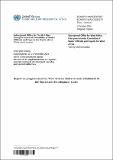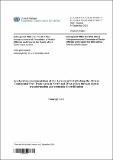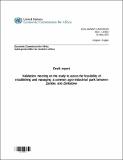Our Institutional Repository is currently undergoing an upgrade. The platform remains accessible for search and consultation. However, user login and content submissions are temporarily disabled. We appreciate your understanding.
Fostering the sustainable transformation of agriculture in Africa through the inclusive green economy a study on livestock value chains in Zimbabwe

View
Download
Published
2020-05Author(s)/Corporate Author (s)
United Nations. Economic Commission for Africa;United Nations. Economic Commission for Africa;
Metadata
Show full item recordAbstract
The current agricultural husbandry in Africa is based on unsustainable practices that are not climateresilient and have negative implications on productivity and the sustainability of environmental and natural resource assets. This calls for an inclusive green economy, and for the sector to step up and improve the quantity and quality of animal products for enhanced human health. The agriculture sector is a significant contributor to the continent’s gross domestic product (GDP) and accounts for more than half of the total employment in sub-Saharan Africa. The transformation of African agriculture – livestock production in particular – presents the continent with much-needed opportunities for inclusive economic growth through value addition, increased productivity, sustained growth and employment creation in both upstream and downstream economic subsectors. The study adopted a mixed-approach research design, in which a combination of thorough desktop study, empirical survey by collecting both primary and secondary data, and stakeholder validation were used to understand the value chains. The results of the study show that there is generally a big opportunity for value chains mainstreaming, as there are many smallholder cattle owners who have been brought into the value chains by the land and agrarian transformation: however, their contribution in the red meat, dairy and leather products markets remains considerably low, even though they have enormous potential to drive the value chains.
Citation
“United Nations. Economic Commission for Africa; United Nations. Economic Commission for Africa (2020-05). Fostering the sustainable transformation of agriculture in Africa through the inclusive green economy a study on livestock value chains in Zimbabwe. Addis Ababa :. © UN. ECA,. https://hdl.handle.net/10855/47834”Collections
- Agriculture [3034]
Related items
Showing items related by title, author, creator and subject.
Report on progress made by West African states towards attainment of the sustainable development goals
United Nations. Economic Commission for Africa; United Nations. Economic Commission for Africa. Subregional Office North Africa (SRO-NA); United Nations. Economic Commission for Africa. Subregional Office West Africa (SRO-WA); United Nations. Economic Commission for Africa; United Nations. Economic Commission for Africa. Subregional Office North Africa (SRO-NA); United Nations. Economic Commission for Africa. Subregional Office West Africa (SRO-WA)
“United Nations. Economic Commission for Africa; United Nations. Economic Commission for Africa. Subregional Office North Africa (SRO-NA); United Nations. Economic Commission for Africa. Subregional Office West Africa (SRO-WA); United Nations. Economic Commission for Africa; United Nations. Economic Commission for Africa. Subregional Office North Africa (SRO-NA); United Nations. Economic Commission for Africa. Subregional Office West Africa (SRO-WA) (2024-10). Report on progress made by West African states towards attainment of the sustainable development goals. Addis Ababa. © UN. ECA,. https://hdl.handle.net/10855/50517”
Accelerating implementation of the Agreement Establishing the African Continental Free Trade Area in North and West Africa through digital transformation and economic diversification : Concept note
United Nations. Economic Commission for Africa. Subregional Office West Africa (SRO-WA); United Nations. Economic Commission for Africa. Subregional Office South Africa (SRO-SA); United Nations. Economic Commission for Africa; United Nations. Economic Commission for Africa; United Nations. Economic Commission for Africa. Subregional Office South Africa (SRO-SA); United Nations. Economic Commission for Africa. Subregional Office West Africa (SRO-WA)
“United Nations. Economic Commission for Africa. Subregional Office West Africa (SRO-WA); United Nations. Economic Commission for Africa. Subregional Office South Africa (SRO-SA); United Nations. Economic Commission for Africa; United Nations. Economic Commission for Africa; United Nations. Economic Commission for Africa. Subregional Office South Africa (SRO-SA); United Nations. Economic Commission for Africa. Subregional Office West Africa (SRO-WA) (2024-09-24). Accelerating implementation of the Agreement Establishing the African Continental Free Trade Area in North and West Africa through digital transformation and economic diversification : Concept note. Addis Ababa:. © UN. ECA,. https://hdl.handle.net/10855/50640”
Draft report Validation meeting on the study to assess the feasibility of establishing and managing a common agro-industrial park between Zambia and Zimbabwe
United Nations. Economic Commission for Africa; United Nations. Economic Commission for Africa. Subregional Office South Africa (SRO-SA); United Nations. Economic Commission for Africa; United Nations. Economic Commission for Africa. Subregional Office South Africa (SRO-SA)
“United Nations. Economic Commission for Africa; United Nations. Economic Commission for Africa. Subregional Office South Africa (SRO-SA); United Nations. Economic Commission for Africa; United Nations. Economic Commission for Africa. Subregional Office South Africa (SRO-SA) (2021-05). Draft report Validation meeting on the study to assess the feasibility of establishing and managing a common agro-industrial park between Zambia and Zimbabwe. Addis Ababa :. © UN. ECA,. https://hdl.handle.net/10855/47759”



